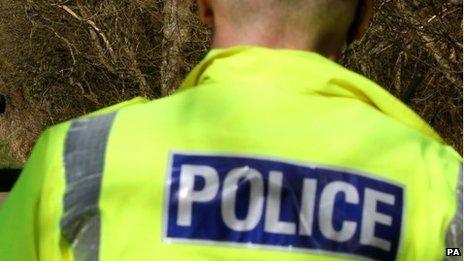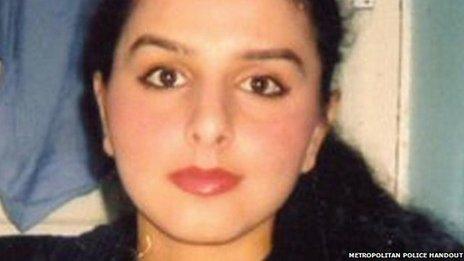'Failings in police recording' of honour violence
- Published

The report warns of a "postcard lottery" when it comes to police forces recording honour crimes
One in five UK police forces is failing to properly record cases of so-called honour violence against women, according to a support group.
It said there was a "postcode lottery" when it came to recording such crimes.
The report, from the Iranian and Kurdish Women's Rights Organisation (IKWRO), also highlighted a lack of proper risk assessment of victims.
The Association of Chief Police Officers (Acpo) said "significant progress" had been made by forces.
The report follows the 2006 killing of Banaz Mahmod, who was murdered by her family because they disapproved of her boyfriend.
Since Miss Mahmod's murder, police forces are supposed to have had a sharper focus on all honour-based crime, including beatings and death threats.
But failings identified in the report included in some areas with communities in which honour-based violence is most likely to occur.
Derbyshire Constabulary, Gloucestershire Constabulary and Staffordshire Police were among those with the most significant failings, according to the report, as well as half of all Scottish police forces before they amalgamated into Police Scotland last April.
Diana Nammi, executive director of IKWRO, said there may be only one chance to protect someone at risk from a so-called "honour killing".
'Not acceptable'
"It is imperative that every police officer, from the telephone operator to those handling the case face-to-face can identify an 'honour'-based violence case, secure the trust of the victim and act appropriately to ensure that they are not further endangered - for example by never communicating with their family or community, from whom they are at risk," she said.
"I recognise that there is some excellent policing of 'honour'-based violence, however I am extremely concerned to find that a number of police forces have failed to implement basic, yet essential measures to protect those at risk from 'honour'-based violence - a serious, organised crime that often involves multiple perpetrators and can result in murder.
"This is not acceptable and must be addressed immediately by the Association of Chief Police Officers."

Banaz Mahmod was murdered by her family because they disapproved of her boyfriend
The IKWRO report, entitled Postcode Lottery: Police Recording of Reported 'Honour' Based Violence, was compiled following Freedom of Information requests to every police force in England, Scotland, Wales and Northern Ireland.
The submissions asked how many incidents of honour-based violence were recorded by each police force in 2012, how many led to criminal charges being processed, and how many charges resulted in convictions.
Ms Nammi has supported calls for a national inquiry into police handling of honour-based violence.
She also urged police to work transparently with the IKWRO to ensure all steps are taken to protect potential victims.
Miss Mahmod, a 20-year-old Iraqi Kurd from Mitcham, south London, contacted police in fear for her life. But her allegations against her family were dismissed.
She was strangled in January 2006 and her body was buried in a suitcase in Birmingham.
Safeguarding victims
The IKWRO report said the proper identification and recording of reports of honour-based violence was crucial to safeguarding victims.
It branded the violence an "organised crime" and insisted that all incidents be treated as key intelligence for risk profiling, risk assessment and risk management.
The report also recommended a review of police training and the procedures in place for risk assessment and recording cases of honour-based violence.
The Acpo lead for honour-based violence, Commander Mak Chishty, said health bodies, schools and colleges and social services were now working more closely to tackle the issue.
He said: "This research rightly recognises that the police service has made significant progress in tackling this honour-based violence in the past 10 years.
"There are now honour-based violence leads in forces and we have been conducting successful investigations into crimes associated with honour-based violence leading to successful prosecution of offenders."
However, he said police were "not complacent about the work yet to be done".
- Published20 September 2013
- Published10 November 2010
- Published3 December 2011